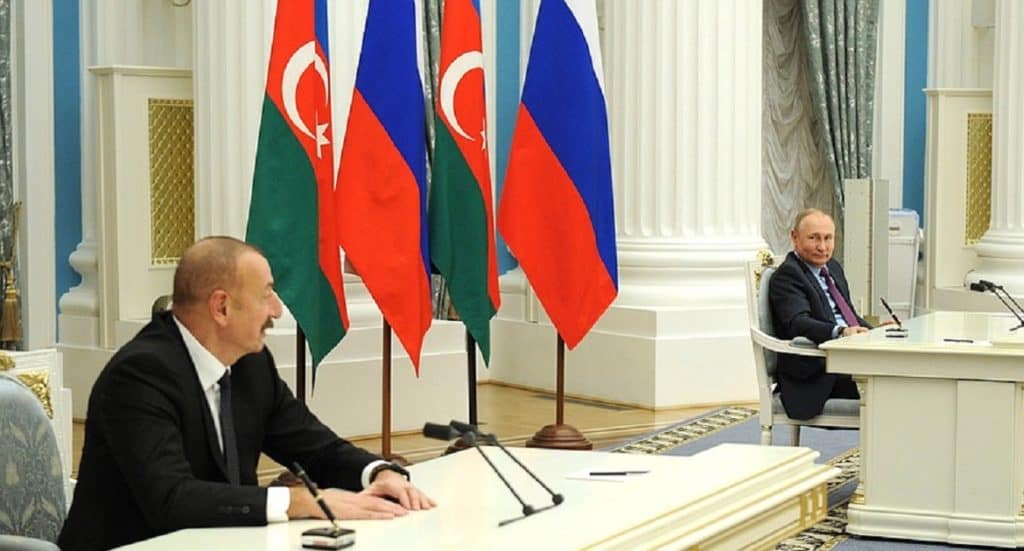By Anton Evstratov
Russian-Azerbaijani relations at the current stage are directly determined, on the one hand, by Moscow’s economic and logistical needs, which have become more relevant as a result of sanctions, and, on the other hand, by Baku’s desire to derive maximum political preferences from them, both in bilateral relations and in establishing maximum influence in Karabakh and the South Caucasus as a whole.

This paradigm of relations is overshadowed in the media by occasional favorable statements from both sides and the current Treaty of Union between Russia and Azerbaijan, signed in February 2022, on the eve of the Russian special operation. However, the latter treaty is evidence that the parties had previously agreed on each other’s role-this may have been the case even before the 2020 war, which was a peculiar outcome of the preliminary agreements.
At the same time, Azerbaijan often does not stop at overtly hostile actions against the Russian Federation. For example, in April the Dagestan Representative Office in Baku was given executive authority status, which formally is a governmental structure but in reality is clearly anti-Russian, aimed at undermining the territorial integrity of the state. The fact is that the Azerbaijani Dagestan representative office is, in fact, completely controlled by the Kurbanov clan of Derbent district. Their leader Seyid Kurbanov has openly criticized and insulted President Putin in the presence of his subordinates.
There are also numerous and regular provocations against Russian peacekeepers in Karabakh. In particular, in early May, the Azerbaijani side set up a checkpoint in the Lachin corridor, gaining direct control over the Artsakh Republic’s supplies from Armenia. Since the Lachin corridor, according to the Nov. 9, 2020 trilateral declaration, is the area of responsibility of Russian peacekeepers, this could not help but have a negative impact on relations between Moscow and Yerevan.
Russia and its peacekeeping mission have been criticized by some Armenian politicians, led (indirectly) by Nikol Pashinyan, and Russia has even had to relieve General Andrey Volkov, commander of the peacekeeping contingent in Karabakh, of his post. The new PKK commander, Colonel General Alexander Lentsov, has a much higher rank, status, and clout in the Russian military than his predecessor (suffice it to say that he was deputy defense minister). However, his attempt to negotiate with the Azerbaijani leadership (for which he personally traveled to Baku) was unsuccessful-the checkpoint in the Lachin corridor still remains, irritating the Armenian side and threatening several Armenian villages in Nagorno-Karabakh with a humanitarian disaster (these are four villages in the Shusha region of the Republic of Artsakh-Mets Shen, Ekhtsaoh, Lisagor, and Hin Shen).
Russia is also concerned about Armenia and Azerbaijan attempts to reach an agreement without its participation, which was reflected, in particular, in the May 1-4 Washington talks. Although these consultations ended inconclusively and rather confirmed the fundamental difference in the positions and approaches of Yerevan and Baku, the very fact of U.S. penetration into the traditional Russian sphere of influence is extremely negative for Moscow.
Azerbaijan’s repeated anti-Russian initiatives at the societal level should not be overlooked – for example, the discontent of a significant part of the latter caused by the letter “Z” on the camouflage and equipment of Russian peacekeepers in Karabakh, as well as the failure to recognize this region-Azerbaijani territory in statements made in conversations with Azerbaijani journalists, blocking, along with the military and pro-government activists, the Lachin corridor.
However, Moscow is ready to tolerate this for several reasons. First, it is the transnational North-South route, which is supposed to connect Russia to India and the Indian Ocean. Azerbaijan is an extremely important link in this mega-corridor, as it has a direct rail link with Russia, ports on the Caspian Sea, and only the final resolution of the issue of the connection with the Iranian rail and general transportation system prevents the route from being fully implemented. Even in spite of the current political problems between Baku and Tehran, this particular branch of the North-South route is crucial for Moscow, which expects the maximum amount of cargo traffic in the shortest possible time.
In theory, there is an alternative option through the territory of Armenia, but preparing the latter’s transportation infrastructure for the tasks at hand will require investments of billions of dollars.
In this regard, Moscow is compelled to make maximum concessions to Azerbaijan – even often at the expense of ally Armenia and despite its irritation and indignation.
The same “transportation” logic also governs the Russian position on the unblocking of transportation corridors in the South Caucasus – in particular, the opening of Armenian territory for the transportation of goods from Azerbaijan to Nakhichevan (“Zangezur corridor”) and possibly to Turkey (with which separate negotiations are underway). On the one hand, Moscow, as well as most non-regional actors, sees such unblocking as extremely beneficial; on the other hand, it is trying to bring the opening routes under its control, claiming to monitor the work of the route through Armenia’s Syunik by its own military. If this plan is successful, given the anti-Russian tensions in the world, Russia will be able to place the South Caucasus region under its military and political control and logistically reach Turkey, Iran and the Middle East as a whole. This kind of control is provided for in the Nov. 9 trilateral declaration, but the validity of this document is now in question, mainly because of Azerbaijan.
In addition, Russia is trying to ensure that its goods can be re-exported through Azerbaijan and ally Turkey. First and foremost, these are energy resources, which are still highly coveted in Europe (especially in the East, which has direct access to Turkish pipelines), and a need that Azerbaijan alone cannot yet meet. This game is extremely risky for Baku, as are the provocations in Karabakh. Both cases unnecessarily draw the attention of Western countries to Azerbaijan, provoking negative statements from politicians of different ranks and levels, although for the time being they are bought by the benefits of this format of cooperation for Europe as the most important part of the West mentioned.
However, it is necessary to pay for it, as well as for the corridor, and Azerbaijan intends to make Russia pay for it entirely. Specifically, within the logic of the “corridor,” Baku seeks to secure and bring under its control the “Zangezur corridor,” bartering it for the possibility of controlling Russian peacekeepers and the relatively free passage of Armenians through the Lachin corridor. This is exactly what caused provocations on the territory of the latter – both earlier (the action of the “environmentalists”) and more recently (the installation of the checkpoint).
Moreover, Azerbaijan’s demands and aspirations now go beyond this scheme unacceptable to the Armenian side-Baku makes no secret of the fact that the checkpoint in the Lachin corridor is the first step toward an alternative to obtaining an Azerbaijani passport, or immediate departure from their places of residence, for Karabakh Armenians.
Undoubtedly, for Russia, the demands and appetites of Azerbaijan, which acts so subjectively that it currently does not even look to Turkey for anything, are extremely undesirable. Not only does this undermine the Armenian-Russian alliance and the regional balance favorable to Russia, but it also raises the question of Moscow’s operations in the South Caucasus as such. As a result, this could lead to a shift in the center of gravity of Russian-Azerbaijani interaction in this region, turning Baku into a leader in its territory, and the dependence of Russian commercial and logistical operations on the Azerbaijani side, which has, among other things, views on a number of settlements in Russian Dagestan, not to mention Russian ally Armenia.
However, at this point Russia is forced to give in. On the one hand, Moscow does not seriously consider the scenario of a fundamental increase in Azerbaijani subjectivity and does not doubt that Russia has leverage over Azerbaijan in an emergency. These include armed forces in the North Caucasus, the Caspian fleet, the possibility of disrupting trade operations, and even Russia’s influence in Iran. On the other hand, Russia’s concessions are currently perceived as temporary, contingent solely on the political and economic situation after the special operation in Ukraine. As soon as the situation changes, Russia will have more freedom of action in the region and the principles of its foreign policy will change. This has been repeatedly stated both by Russian experts and, for example, by the RMK command in talks with Karabakh citizens.
Initially Moscow and the allies in Yerevan counted on this variant, however, the FR seems not to have taken into consideration the possible difficulties in Ukraine, whose special operation in the territory, according to the plans, should have ended much earlier. As a result, Baku’s concessions to the Russian side continue and Azerbaijan has correctly grasped the essence.
An important milestone in the implementation of the current paradigm of Russian-Azerbaijani relations will be in 2025, when the declared five-year mandate of the Russian peacekeeping force in Nagorno-Karabakh expires. If Russia fails to complete its operation in Ukraine before that time, Azerbaijan will certainly raise the issue of the PKK’s further stay in Karabakh in the context of new concessions by Russia and, under pressure from Russia, Armenia, which Moscow will have to accept or get all those logistical, economic and political problems that Azerbaijan can create for it. Undoubtedly, theoretically Russia is capable of solving them, but for that it is necessary first to start solving them now or even earlier, which has not been done and is not being done, and secondly to use significant resources for that. Whether Moscow will have them in 2025 depends, again, primarily on success in Ukraine, which will ultimately determine not only Russian-Azerbaijani relations, but also the image of the entire South Caucasus and the post-Soviet space as a whole.
Author: Anton Evstratov – Russian historian, journalist and journalist living in Armenia, lecturer at the Department of General History and Foreign Regional Studies at the Russian-Armenian University in Yerevan.
(The opinions expressed in this article are solely those of the author and do not necessarily reflect the views of World Geostrategic Insights).







